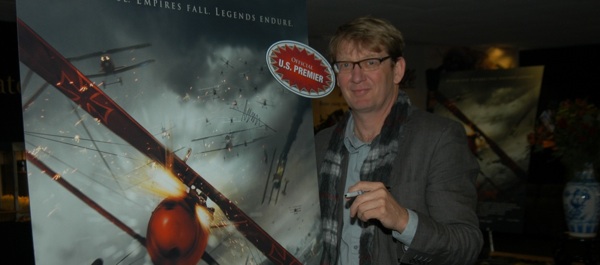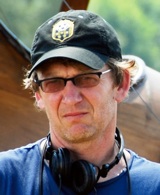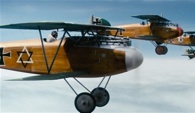Interview with Nikolai Muellerschoen About His Red Baron Film

Manfred von Richthofen is more honored in the United States and England than he is in Germany.
Nikolai Muellerschoen of Germany is the writer, director and co-producer of The Red Baron, a new film based on the life of Manfred von Richthofen, a World War I pilot with 80 kills to his record. His film had its United States premier at The Reel Stuff Film Festival of Aviation in Dayton, Ohio, on March 15, 2009. Muellerschoen introduced the film and then spent a considerable amount of time conducting a question-and-answer session with the attendees in the packed theater. Audience reaction was very enthusiastic.
{default}Muellerschoen has scripted and directed numerous films in Europe and the United States including Operation Dead End (1986), Deadly Measures (1995), Der Erlkonig (1999) and has scripted Twelfth Angel and Tut-Anch-Amun for Roland Emmerich’s Centropolis Films. He was kind enough to sit down with writer and film historian Rick Martin to talk about this new film.
Rick Martin: Your new film, The Red Baron, was a labor of love for you.
Nikolai Muellerschoen: Yes, from script to final movie it took us over five years to produce. The most difficult problem was trying to find the financing for the movie. We ended up raising 18 million Euros, about $22 million dollars, to make it.
Martin: It looks like it cost much more. In Hollywood, it would have probably cost $100 million with all the special effects and period airplanes, clothing and cars. How is von Richthofen regarded in Germany? In the USA, he is regarded as something of a hero.
Muellerschoen: von Richthofen is more honored in the United States and England than he is in Germany. Germans are somewhat psychologically damaged because we started the worst war in history, so anyone having to do with the military is looked down upon. We had some critics in Germany who said, "How can you glorify the mass murderer of more than 80 people?" I was somewhat crucified over there. What they didn’t understand is that as von Richthofen saw more and more death he started to turn against the war and bloodshed in general. That’s the tone I took in the film—this shift in von Richthofen’s views.
 Martin: There are some amazing dogfights in the film, some with 20 or 30 planes including Albatrosses, Dr Is, Gothas, Handley Pages, Spads, Se5s, etc. How did you do all that on $22 million?
Martin: There are some amazing dogfights in the film, some with 20 or 30 planes including Albatrosses, Dr Is, Gothas, Handley Pages, Spads, Se5s, etc. How did you do all that on $22 million?
Muellerschoen: All the air battles were done with CGI (computer-generated imagery)—we tried to find stuntmen to fly some of the real planes in the battles and they all said, "Are you crazy?" For insurance and safety purposes, we even had to CGI the airplane propellers and machine gun bursts. We ended up with one real Albatross, twenty-two or twenty-three 1:1 scale mockups and all the rest were done by computers.
Martin: You couldn’t tell; the CGI was fantastic. Why was the story of von Richthofen applicable to today? What drove you to tell his story?
Muellerschoen: von Richthofen was a man who started out thinking that war was glorious and noble. He saw the fighting in the air as a duel between two men. As the war progressed and von Richthofen was manipulated by the German government into a media star, kind of a god, he began to see that he was only a killer. I see kids today looking at their video games and thinking that war is a game. I don’t think that times have changed all that much.
Martin: You took some dramatic liberties with von Richthofen’s story . . .
 Muellerschoen: Yes, this film is not a documentary. We had von Richthofen meet Brown, the Canadian pilot who may have shot him down, and we added a romance that von Richthofen may have actually had with the nurse who helped him when he received his head wound. There were rumors that he had this relationship, but no one has ever been able to prove it. We know that von Richthofen did actually meet some British pilots so we turned this into some dramatic conversations with Brown. We also took an amalgam of many of the Jewish pilots who fought for the German Empire and worked them into the pilot who is Richthofen’s friend. Many people don’t know about all the Jewish pilots and other soldiers for fought for Germany during World War I. In the 1940s, many of those same people were sent to concentration camps still clutching their Iron Crosses for service to the Fatherland.
Muellerschoen: Yes, this film is not a documentary. We had von Richthofen meet Brown, the Canadian pilot who may have shot him down, and we added a romance that von Richthofen may have actually had with the nurse who helped him when he received his head wound. There were rumors that he had this relationship, but no one has ever been able to prove it. We know that von Richthofen did actually meet some British pilots so we turned this into some dramatic conversations with Brown. We also took an amalgam of many of the Jewish pilots who fought for the German Empire and worked them into the pilot who is Richthofen’s friend. Many people don’t know about all the Jewish pilots and other soldiers for fought for Germany during World War I. In the 1940s, many of those same people were sent to concentration camps still clutching their Iron Crosses for service to the Fatherland.
Martin: Did any of von Richthofen’s family see the film?
Muellerschoen: von Richthofen’s great-nephew came to the set and saw Matthias Schweighöfer dressed as von Richthofen. He went up to Schweighofer and said, "Finally I meet you, great uncle." It was interesting. I think his family liked the film.
Martin: Good luck with The Red Baron and thank you for the interview.
Muellerschoen: Thank you. I’m glad you liked the movie.
Muellerschoen is currently seeking a U.S. distributor to give The Red Baron national distribution. Click here to read Rick Martin’s preview of the film.


0 Comments
Trackbacks/Pingbacks